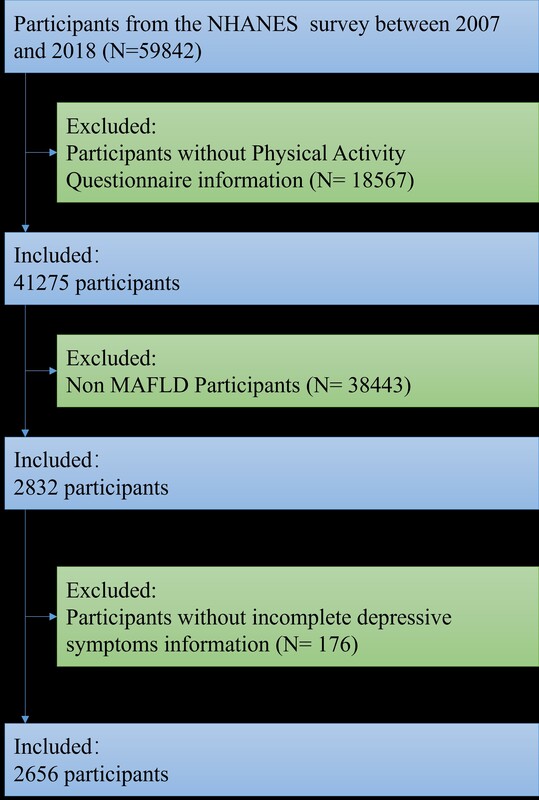Current issue
Archive
Manuscripts accepted
About the Journal
Editorial office
Editorial board
Abstracting and indexing
Subscription
Contact
Ethical standards and procedures
Most read articles
Instructions for authors
Article Processing Charge (APC)
Regulations of paying article processing charge (APC)
METABOLIC DISORDERS / RESEARCH PAPER
The Association Between Metabolic Associated Fatty Liver Disease and Depression in Adults: The Role of Physical Activity Levels and Types
1
School of Physical Education, Nanchang Normal University, Nanchang, 330000, Jiangxi, China, China
2
Department of Physical Education, College of Education, Korea University, Seoul, 02841, Republic of Korea, Korea (South)
3
School of Dance and Martial Arts, Capital University of Physical Education and Sports, Beijing, 100000 China, China
4
Shenzhen Hospital (Futian) of Guangzhou University of Chinese Medicine, No. 6001, North Ring Road, Futian District, Shenzhen, 518048, Guangdong, China, China
5
Department of International Culture Education, Chodang University,Muan, 58530, Republic of Korea, Korea (South)
Submission date: 2024-06-27
Final revision date: 2024-07-30
Acceptance date: 2024-08-16
Online publication date: 2024-09-06
Corresponding author
Dong Li
Department of International Culture Education, Chodang University,Muan, 58530, Republic of Korea, Korea (South)
Department of International Culture Education, Chodang University,Muan, 58530, Republic of Korea, Korea (South)
KEYWORDS
National Health and Nutrition Examination Surveymetabolic dysfunction associated fatty liver diseasePhysical Activity Levels and Types
TOPICS
ABSTRACT
Introduction:
At now, the association between levels of physical activity and depression is not well understood, however depressive symptoms are common in patients with metabolic dysfunction associated fatty liver disease (MAFLD).
Material and methods:
This study aims to investigate whether there is a correlation between MAFLD patients' levels of moderate to vigorous recreational exercise and depression. From the National Health and Nutrition Examination Survey (NHANES) database, 2656 individuals with MAFLD were included in this investigation. Depressive symptoms were examined in connection to varying degrees of entertainment activity using a generalized linear model that was weighted on numerous factors.
Results:
After accounting for all potential confounding factors, the weighted generalized linear model revealed a negative correlation between moderate entertainment activity and depression (OR=0.599, 95% CI: 0.475-0.755; P<0.001). This correlation persisted even after controlling for other variables. In spite of this, after controlling for all potential confounding variables, there was still no correlation between the intensity of entertainment activity and depression. Females who engage in moderate amounts of amusement are less likely to suffer from depression, according to subgroup analysis (OR=0.657, 95% CI: 0.440-0.983; P =0.036).
Conclusions:
This link persists after controlling for other variables; patients with MAFLD are more prone to depression, whereas those with higher levels of moderate recreational activity are less likely to suffer from depression. Their depressed symptoms may be treatable by modest recreational activity, according to these results.
At now, the association between levels of physical activity and depression is not well understood, however depressive symptoms are common in patients with metabolic dysfunction associated fatty liver disease (MAFLD).
Material and methods:
This study aims to investigate whether there is a correlation between MAFLD patients' levels of moderate to vigorous recreational exercise and depression. From the National Health and Nutrition Examination Survey (NHANES) database, 2656 individuals with MAFLD were included in this investigation. Depressive symptoms were examined in connection to varying degrees of entertainment activity using a generalized linear model that was weighted on numerous factors.
Results:
After accounting for all potential confounding factors, the weighted generalized linear model revealed a negative correlation between moderate entertainment activity and depression (OR=0.599, 95% CI: 0.475-0.755; P<0.001). This correlation persisted even after controlling for other variables. In spite of this, after controlling for all potential confounding variables, there was still no correlation between the intensity of entertainment activity and depression. Females who engage in moderate amounts of amusement are less likely to suffer from depression, according to subgroup analysis (OR=0.657, 95% CI: 0.440-0.983; P =0.036).
Conclusions:
This link persists after controlling for other variables; patients with MAFLD are more prone to depression, whereas those with higher levels of moderate recreational activity are less likely to suffer from depression. Their depressed symptoms may be treatable by modest recreational activity, according to these results.
We process personal data collected when visiting the website. The function of obtaining information about users and their behavior is carried out by voluntarily entered information in forms and saving cookies in end devices. Data, including cookies, are used to provide services, improve the user experience and to analyze the traffic in accordance with the Privacy policy. Data are also collected and processed by Google Analytics tool (more).
You can change cookies settings in your browser. Restricted use of cookies in the browser configuration may affect some functionalities of the website.
You can change cookies settings in your browser. Restricted use of cookies in the browser configuration may affect some functionalities of the website.



